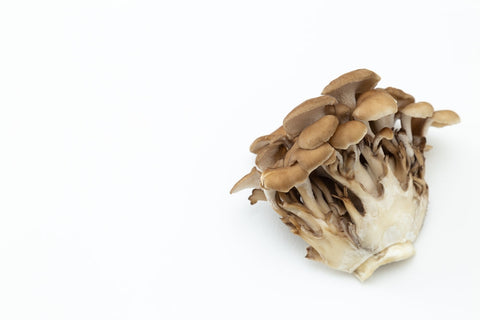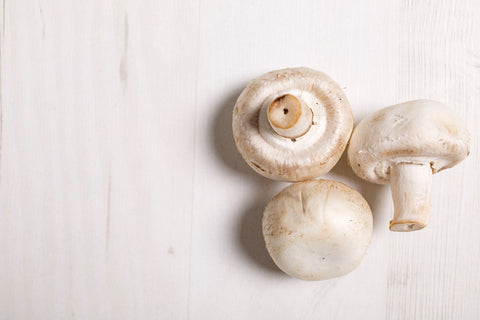If you’ve strolled through a forest before, you might have spotted the fan-shaped, colorful growths attached to fallen logs. These are turkey tail mushrooms, and for centuries, they have been a big deal in traditional medicine. But the buzz about turkey tail isn’t just folklore — modern science is uncovering more reasons to get excited every day. In this week’s deep dive, we explore the health benefits of turkey tail, revealing why this humble fungus is earning a seat at the wellness table.
What Are Turkey Tail Mushrooms?
Turkey tail (scientifically known as Trametes versicolor) looks as striking as its name: bands of color giving it the appearance of a wild turkey’s tail feathers. But beyond beauty, these mushrooms pack a powerful nutritional and medicinal punch, as both history and recent studies reveal [4].
They have long been fixtures in traditional Asian remedies — used to detoxify, boost energy, strengthen organs, and extend life [4]. Today, turkey tail mushrooms are widely available as powders, teas, and supplements.
But what does the latest research tell us about their real-world health benefits? Let’s dive into the science.
If you’re curious about how other medicinal mushrooms compare, check out our quick overview of the health benefits of functional mushrooms.
1. Immune System Support: Powering Up the Body’s Defense
First and foremost, turkey tail mushrooms are celebrated for their impact on immune health. This isn’t just hearsay. Clinical studies have pinpointed two key bioactive compounds: polysaccharopeptides (PSP) and polysaccharide Krestin (PSK). These work as immune modulators, essentially helping to balance and boost immune cell activity [2][5].
The mushrooms also contain beta-glucans — natural sugars studied for their immune-enhancing properties. Beta-glucans appear to “train” the immune system to identify and fight off harmful invaders, such as bacteria and viruses [2].
“Turkey tail is commonly used alongside chemotherapy and radiation. Its immunomodulatory effects can help reduce the side effects of these treatments while boosting immune resilience. As an adaptogen, turkey tail helps the body adapt to stress and can support hormonal balance, making it a beneficial addition for overall resilience and well-being” [1].
Looking for even more immune-supporting mushrooms? Discover the health benefits of Reishi, the “Mushroom of Immortality.” You might also want to explore how Shiitake mushrooms can strengthen your immune system and heart health.
2. Antioxidant Properties: Fighting Oxidative Stress
Modern living exposes us to numerous stressors — from pollution to processed foods — including substances that damage our cells, known as free radicals. Turkey tail mushrooms are loaded with antioxidants, chemicals that neutralize these harmful agents [4].
This antioxidant action can help:
- Protect DNA from oxidative damage
- Slow cellular aging
- Support longevity [4]
The main antioxidant compounds in turkey tail include phenols and flavonoids, both of which have been proven to prevent damage before it accumulates.
Looking for another antioxidant powerhouse? Explore the top health benefits of Chaga mushrooms—another ancient remedy loaded with free radical-fighting compounds.
3. Gut Health and Prebiotic Effects: Feeding the Good Guys in Your Belly
Did you know your gut holds more bacteria than your body has cells? Maintaining a healthy balance of these microbes is crucial to overall health. Turkey tail mushrooms act as a prebiotic, meaning they feed the beneficial bacteria necessary for digestion, a strong immune system, and disease prevention [1][3].
Specifically, turkey tail:
- Nourishes friendly bacteria like Bifidobacterium and Lactobacillus
- Helps curb potentially harmful germs like Clostridium and Staphylococcus [1][3]
When your gut is in balance, you’re likely to experience:
- Easier digestion and less bloating
- Stronger immune defenses
- Lower cholesterol
- Possible protection against certain cancers [3]
If you're interested in how mushroom-infused drinks—such as mushroom coffee—can also support digestive wellness, be sure to check out our guide!
4. Anti-Inflammatory Effects: Soothing the Body’s Fires
Inflammation is a natural part of the immune response, but when it sticks around too long, it can fuel disease. Turkey tail mushrooms contain compounds known as polysaccharides that have demonstrated anti-inflammatory action [1][4].
These properties may be especially relevant for people dealing with:
Regular use could encourage a calmer, more balanced immune response.
Want to discover other mushrooms celebrated for their anti-inflammatory and immune balancing effects? Explore the benefits of Maitake mushrooms and how they help support immunity and wellness.
5. Support in Cancer Treatment: An Ally in the Fight
Cancer therapies like chemotherapy and radiation can be life-saving, but they’re also tough on the body. Exciting research shows turkey tail mushrooms, and specifically their compounds PSP and PSK, may help cancer patients by:
- Improving response to traditional treatments
- Reducing treatment side effects by strengthening immune function
- Potentially slowing tumor growth, especially in cancers like gastric and colorectal types [1][5]
PSK, for example, is a standard ingredient in cancer therapy in Japan. While more robust human studies are needed, results so far are promising for making turkey tail a helpful companion in oncology care [5].
If you’re interested in how different mushrooms stack up for overall health—including immunity, energy, and cognitive support—our functional mushrooms quick overview includes a handy chart.
6. Antiviral Properties: Nature's Defense Against Infections
With viral threats constantly emerging, interest is mounting in turkey tail’s antiviral capabilities. Research suggests these mushrooms might:
- Aid in managing viral infections such as herpes and shingles
- Inhibit enzymes important for HIV replication [1][4]
While this evidence is still in the early stages, the potential adds intrigue to turkey tail’s already impressive resume.
7. Additional Potential Benefits: More Than Just Immunity
Turkey tail doesn’t stop with immune support and gut health. It’s also linked to a variety of other possible wellness rewards:
- Liver Health: Used in folk medicine to support the liver, though scientific evidence is still emerging [4].
- Fatigue & Athletic Performance: Some reports point to reduced fatigue and improved exercise endurance, but this area needs more robust data [5].
- Blood Sugar Control: Early findings hint that turkey tail may help regulate blood sugar levels, of particular interest for those monitoring diabetes or metabolic health [4].
- Urinary & Respiratory Infections: Traditionally used for these ailments, though conclusive modern research is lacking [5].
- Stress Adaptation: As an adaptogen, turkey tail may help the body adapt to both physical and emotional stress, supporting hormone balance and overall resilience [1][4].
Adaptogens are a key concept in functional wellness—see Ashwagandha’s benefits as another well-known adaptogen in modern and traditional wellness.
Turkey Tail Mushrooms in Traditional Medicine
Long before scientific journals validated their benefits, turkey tail mushrooms were core ingredients in traditional medicinal systems across Asia [4]. Healers used them to:
- Remove toxins from the body
- Boost energy and vitality
- Fortify internal organs
- Promote long life and resilience
For a deeper dive into how mushrooms like Shiitake are used around the world in both cuisine and tradition, check out Exploring the World of Shiitake Mushrooms.
Today, modern research continues to catch up with — and often confirm — these ancient practices.
Scientific Strengths and Safety: What We Know
While turkey tail is generally safe for most people as a dietary supplement, here’s what’s important to know:
- Safety: The mushroom is low in toxicity, safe for long-term use in most healthy adults. However, people with immune disorders or those receiving immunotherapy should speak to their healthcare provider first [5].
- Possible Side Effects: Generally rare but may include mild digestive upset for some.
- Evidence Quality: Turkey tail’s benefits for immunity, gut health, and cancer care have a growing foundation of clinical and laboratory research. But traditional uses, like for fatigue or urinary infections, are often based on folk wisdom and require more studies [5].
Wondering about the safest and most effective ways to take mushrooms—capsules, extracts, powders, or even in drinks? Compare the best mushroom supplement forms to achieve your goals in this comprehensive guide.
Quick Reference: Key Benefits of Turkey Tail Mushroom
For easy comparison, here’s a breakdown of science-backed and traditional claims:
| Benefit | Evidence Level | Key Compounds |
|---|---|---|
| Immune system support | Supported by research | PSP, PSK, beta-glucans |
| Antioxidant protection | Supported by research | Phenols, flavonoids |
| Gut health and microbiome balance | Supported by studies | Prebiotic polysaccharides |
| Adjunct in cancer treatment | Moderate evidence | PSP, PSK |
| Anti-inflammatory effects | Supported, but limited | Polysaccharides |
| Antiviral activity | Emerging evidence | PSP |
| Liver health, fatigue, blood sugar | Largely traditional use | N/A |
Final Thoughts: A Tiny Mushroom with Mighty Potential
From forest floors to pharmacy shelves, the journey of turkey tail mushrooms is nothing short of inspiring. Whether it’s supporting immune response, fighting free radicals, or lending a hand in cancer care, this vibrant fungus continues to spark scientific curiosity.
As research progresses, turkey tail mushrooms may very well transform from a folk remedy into a regular feature in modern preventive care and wellness routines. For now, the evidence is promising — but, as always, it’s best to consult with a healthcare provider before beginning any new supplement, especially if you have chronic health concerns or are currently undergoing medical treatment.
Feeling inspired? The story of turkey tail mushrooms is just beginning — and you can be a part of that story for your own health and well-being.
References
-
[1] https://mushroommountain.com/
the-magical-benefits-of- turkey-tail-mushroom-with- recipe/ -
[2] https://herbaly.com/blogs/
wellness/turkey-tail-mushroom- benefits -
[3] https://www.healthline.com/
nutrition/turkey-tail-mushroom -
[4] https://antioxi-supplements.
com/blogs/our-mushroom-blogs/ ultimate-guide-to-turkey-tail- health-benefits-uses- medicinal-research -
[5] https://www.webmd.com/
vitamins/ai/ingredientmono- 648/turkey-tail-mushroom


